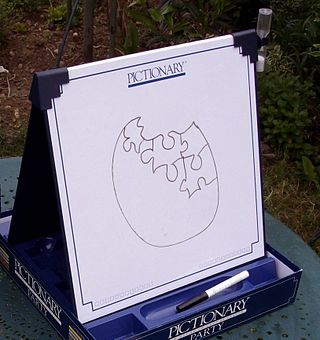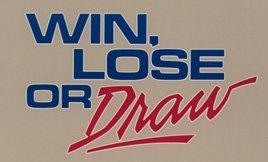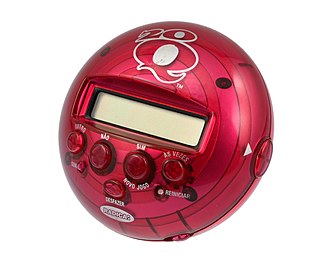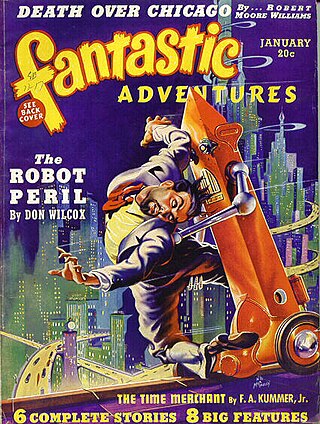
Pictionary is a charades-inspired word-guessing game invented by Robert Angel with graphic design by Gary Everson and first published in 1985 by Angel Games Inc. Angel Games licensed Pictionary to Western Publishing. Hasbro purchased the rights in 1994 after acquiring the games business of Western Publishing. Mattel acquired ownership of Pictionary in 2001. The game is played in teams with players trying to identify specific words from their teammates.
A computer poker player is a computer program designed to play the game of poker, against human opponents or other computer opponents. It is commonly referred to as pokerbot or just simply bot. As of 2019, computers can beat any human player in poker.

An AI takeover is a scenario in which artificial intelligence (AI) becomes the dominant form of intelligence on Earth, as computer programs or robots effectively take control of the planet away from the human species. Possible scenarios include replacement of the entire human workforce due to automation, takeover by a superintelligent AI, and the popular notion of a robot uprising. Stories of AI takeovers are very popular throughout science fiction. Some public figures, such as Stephen Hawking and Elon Musk, have advocated research into precautionary measures to ensure future superintelligent machines remain under human control.

Win, Lose or Draw is an American television game show that aired from 1987 to 1990 in syndication and on NBC. It was taped at CBS Television City, often in Studios 31, 33, and 43 at various times. It was co-produced by Burt & Bert Productions and Kline & Friends for Disney's Buena Vista Television. It has also had two versions on The Disney Channel: Teen Win, Lose or Draw from 1989 to 1992, and a revived version known as Disney's Win, Lose or Draw which aired in 2014. New York described Win, Lose or Draw as "a knockoff" of the board game Pictionary, however, Burt Reynolds and Ed McMahon referred to playing the game at Burt's home during the August 2, 1978 episode of The Tonight Show, with Johnny Carson, three years before Pictionary was created.

20Q is a computerized game of twenty questions that began as a test in artificial intelligence (AI). It was invented by Robin Burgener in 1988. The game was made handheld by Radica in 2003, but was discontinued in 2011 because Techno Source took the license for 20Q handheld devices.
Weak artificial intelligence is artificial intelligence that implements a limited part of the mind, or, as narrow AI, is focused on one narrow task. In John Searle's terms it “would be useful for testing hypotheses about minds, but would not be minds”. Weak artificial intelligence focuses on mimicking how humans perform basic actions such as remembering things, perceiving things, and solving simple problems. As opposed to strong AI, which uses technology to be able to think and learn on its own. Computers can use methods such as algorithms and prior knowledge to develop their ways of thinking as human beings do. Strong artificial intelligence systems are learning how to run independently of the programmers who programmed them. Weak AI is not able to have a mind of its own, and can only imitate physical behaviors that it can observe. It is contrasted with Strong AI, which is defined variously as:
In video games, artificial intelligence (AI) is used to generate responsive, adaptive or intelligent behaviors primarily in non-playable characters (NPCs) similar to human-like intelligence. Artificial intelligence has been an integral part of video games since their inception in the 1950s. AI in video games is a distinct subfield and differs from academic AI. It serves to improve the game-player experience rather than machine learning or decision making. During the golden age of arcade video games the idea of AI opponents was largely popularized in the form of graduated difficulty levels, distinct movement patterns, and in-game events dependent on the player's input. Modern games often implement existing techniques such as pathfinding and decision trees to guide the actions of NPCs. AI is often used in mechanisms which are not immediately visible to the user, such as data mining and procedural-content generation.

Pictionary, taglined The Game of Video Quick Draw, is a video board game developed by Software Creations and published by LJN for the Nintendo Entertainment System. It is based on the board game of the same name. Players may play in up to four teams of unlimited players.
General game playing (GGP) is the design of artificial intelligence programs to be able to play more than one game successfully. For many games like chess, computers are programmed to play these games using a specially designed algorithm, which cannot be transferred to another context. For instance, a chess-playing computer program cannot play checkers. General game playing is considered as a necessary milestone on the way to artificial general intelligence.
The ethics of artificial intelligence is the branch of the ethics of technology specific to artificially intelligent systems. It is sometimes divided into a concern with the moral behavior of humans as they design, make, use and treat artificially intelligent systems, and a concern with the behavior of machines, in machine ethics.
There are a number of competitions and prizes to promote research in artificial intelligence.

The Turing test, originally called the imitation game by Alan Turing in 1950, is a test of a machine's ability to exhibit intelligent behaviour equivalent to, or indistinguishable from, that of a human. Turing proposed that a human evaluator would judge natural language conversations between a human and a machine designed to generate human-like responses. The evaluator would be aware that one of the two partners in conversation was a machine, and all participants would be separated from one another. The conversation would be limited to a text-only channel, such as a computer keyboard and screen, so the result would not depend on the machine's ability to render words as speech. If the evaluator could not reliably tell the machine from the human, the machine would be said to have passed the test. The test results would not depend on the machine's ability to give correct answers to questions, only on how closely its answers resembled those a human would give. Since the Turing test is a test of indistinguishability in performance capacity, the verbal version generalizes naturally to all of human performance capacity, verbal as well as nonverbal (robotic).
The Allen Institute for AI is a 501(c)3 non-profit research institute founded by late Microsoft co-founder and philanthropist Paul Allen in 2014. The institute seeks to conduct high-impact AI research and engineering in service of the common good. Oren Etzioni was appointed by Paul Allen in September 2013 to direct the research at the institute. After leading the organization for nine years, Oren Etzioni stepped down from his role as CEO on September 30, 2022. He was replaced in an interim capacity by the leading researcher of the company's Aristo project, Peter Clark. On June 20, 2023, AI2 announced Ali Farhadi as its next CEO starting July 31, 2023. The company's board formed a search committee for a new CEO. AI2 also has an active office in Tel Aviv, Israel.

Drawception is a multiplayer web-based drawing and guessing game. Considered similar to the telephone game, it was created by Jeremiah Freyholtz and released as an early beta on March 24, 2012, or March 26, 2012. The game is currently owned by Blue Flame Labs, which also owns MobyGames.

AI takeover—the idea that some kind of artificial intelligence may supplant humankind as the dominant intelligent species on the planet—is a common theme in science fiction. Famous cultural touchstones include Terminator and The Matrix.

Quick, Draw! is an online Guessing game developed and published by Google that challenges players to draw a picture of an object or idea and then uses a neural network artificial intelligence to guess what the drawings represent. The AI learns from each drawing, improving its ability to guess correctly in the future. The game is similar to Pictionary in that the player only has a limited time to draw. The concepts that it guesses can be simple, like 'foot', or more complicated, like 'animal migration'.
AlphaStar is a computer program by DeepMind that plays the video game StarCraft II. It was unveiled to the public by name in January 2019. In a significant milestone for artificial intelligence, AlphaStar attained Grandmaster status in August 2019.
Artificial intelligence and machine learning techniques are used in video games for a wide variety of applications such as non-player character (NPC) control and procedural content generation (PCG). Machine learning is a subset of artificial intelligence that uses historical data to build predictive and analytical models. This is in sharp contrast to traditional methods of artificial intelligence such as search trees and expert systems.
Meta AI is an artificial intelligence laboratory owned by Meta Platforms Inc. Meta AI develops various forms of artificial intelligence, developing augmented and artificial reality technologies. Meta AI is an academic research laboratory focused on generating knowledge for the AI community. This is in contrast to Facebook's Applied Machine Learning (AML) team, which focuses on practical applications of its products.








